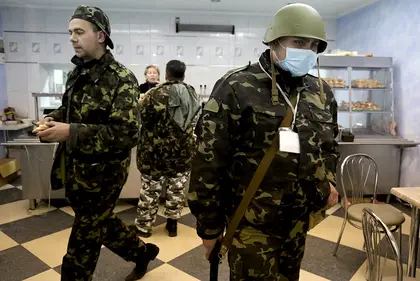A 48-hour ultimatum came and went from Arsen Avakov, the nation’s top cop, who threatened the separatist militants with force if they don’t hand over their weapons and vacate the SBU building. But the insurgents, who call themselves Army of the Southeast, vow not to surrender until their demands are met.
“There are enough of people here. Former military men, civilians, we have girls cooking for us. This situation united many different people,” Aleksey Kariakin, one of the leaders of army, told the Kyiv Post inside the captured SBU headquarters.
- Obtain the freshest war in ukraine update from the Kyiv Post's daily news coverage today.
- Get the newest Ukraine news reports as of today.
JOIN US ON TELEGRAM
Follow our coverage of the war on the @Kyivpost_official.

A native of Stahanov in Luhansk Oblast, Kariakin is personally carrying out negotiations with Andriy Parubiy, secretary of National Security and Defense Council, who came to Luhansk in a bid to end the standoff.
The insurgents demand the authorities to stop an anti-terrorist operation against them and other separatists of Ukraine’ southeast. They also want the Russian language to have official status as well a law allowing local referendums and legalization of their army.
But their top aim is federalization of the country through all-Ukrainian referendum, one step from secession from the nation. “It should be a federation in the borders of Ukraine, but with the right to separate if people demand this,” Kariakin said, confident that 85 percent of people in Luhansk Oblast, Ukraine’s seventh most populous with 2.2 million people, support him.
Prime Minister Arseniy Yatsenyuk, in neighboring Donetsk on April 11, that local referendums are possible, but only to decide local issues. He also assured the residents of the mostly Russian-speaking southeast that the government would not revoke the current law on regional languages that, in fact, gives Russian official status in these regions.
The insurgents in Luhansk took the news as their “little but well-deserved victory,” Valery Bolotov, who called himself a member of their headquarters, said.

They deny government accusations that they are terrorists, or the central SBU office in Kyiv’s claim they they took 60 people as hostages overnight. “No person has ever been kept here against his will,” Kariakin said.
The insurgents admit that a police raise is still highly probable, noting that in buildings and offices around them, residents and workers have already been evacuated. They said the raid didn’t happen yet since they claim members of local Alfa special SBU forces refused to participate in the attack. “But they can bring forces from the western regions,” Kariakin said.
Although the insurgents replaced the Ukrainian state emblem with the Russian two-head eagle above the entrance of the SBU building, they deny having direct contacts with Russia or the presence of Russian militants among them.
But the activists of the tent camp that grew up around the building to supply and protect the insurgents inside regularly raise their spirits with shouting “Russia!” and waving the Russian flags.
Father Aleksey is a priest who traveled to Luhansk from a Russian border region to support “Russian Orthodox believers.” He said “the majority of people to whom I spoke here support joining Russia and oppose the junta in Kyiv.” Soon after, a group of middle-aged women started assisting him in construction of church tent.
On April 11, the tent camp added new fortification, including plastic sheds to protect protesters from rain and also iron spikes along the roads leading to the camp aimed at stopping police vehicles.
Liubov Chaikovskaya, a 67-year-old pensioner, said she donated Hr 5 today for the purchase of plastic tarps to cover the sheds. “I don’t like the authorities that are supporting the nationalists,” she said. “I’m ready to live in Ukraine but with another government.”
Just like insurgents inside of the building, people outside don’t say they want to necessarily join Russia, but they claim they want more authority given for their region and fear “nationalists” from the western Ukraine.
Many supporters also fear that the men who seized the SBU headquarters will be captured and imprisoned for terrorism.
Liubov Karlova, a 49-year-old nurse, said she comes every day before and after her work shift at a hospital. “There are our boys inside, we know them, we will stay for them as a human shield,” she said.
Kyiv Post staff writer Oksana Grytsenko can be reached at grytsenko@kyivpost.com Kyiv Post photo journalist Anastasia Vlasova contributed reporting to the story.
Editor’s Note: This article has been produced with support from the project www.mymedia.org.ua, financially supported by the Ministry of Foreign Affairs of Denmark, and implemented by a joint venture between NIRAS and BBC Media Action.The content in this article may not necessarily reflect the views of the Danish government, NIRAS and BBC Action Media.
You can also highlight the text and press Ctrl + Enter




